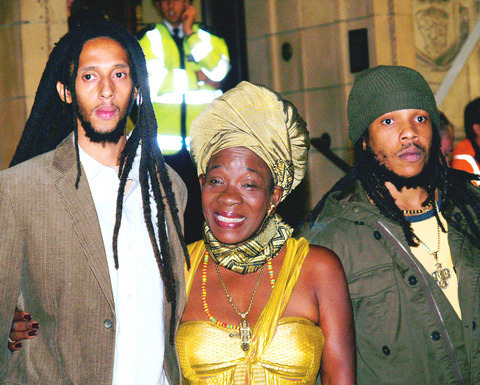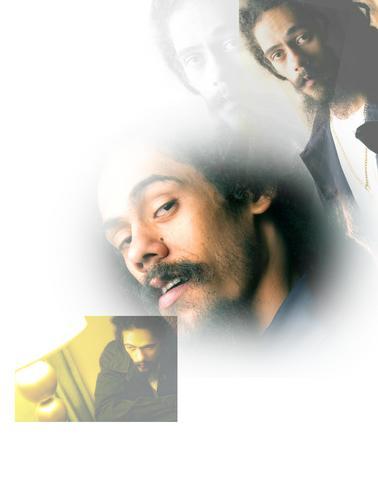Few would be surprised to learn that the artist with the second biggest debut ever for a reggae album on the Billboard 200 carries the surname Marley.
Yet, the honor belongs not to the late, great reggae superstar Bob Marley, but his son, Damian.
Welcome to Jamrock, Damian "Jr. Gong" Marley's third album, has been one of this year's unexpected hits, largely on the strength of the title song, a heart-pumping blend of reggae and hip-hop that crashed urban radio stations this summer. Released in September, the album sold 86,000 copies, landing at number seven for its first week. Nearly two months later, the album remains in the top 100. (Several weeks later, Sean Paul topped Marley's accomplishment when The Trinity sold more than 107,000 copies.) It's been quite the year for Marley, who recently won Vibe's magazine's "Boomshot" award honoring Caribbean music, and electrified the ceremony's audience with his performance of Welcome to Jamrock.

PHOTO: AFP
"It's a great feeling. I feel very blessed," says Marley during a recent telephone interview. "We worked very hard on this album, and the response from the people has been very rewarding."
By the time Welcome to Jamrock was released, Marley was already a Grammy-winning artist. His 2001 album, Halfway Tree picked up the prestigious award for best reggae album, but it was his latest effort that introduced him outside of the reggae community.
"The beauty of [Welcome to Jamrock] is that it lays the groundwork for a new generation," says Kyle Russell, who runs reggae4i.com, and owner of KRucial Reggae, a Somerville-based booking and management agency. "I think people are digging him, people are loving it. I think they like the alternative hybrid combination of dancehall, reggae, and hip-hop. I think it's a very important statement of where the music is today."

Still, Marley, 27, maintains that he did not record Welcome to Jamrock, which features such guests as Bobby Brown, Nas, and Black Thought from the Roots, as a conscious attempt to cross over.
"I didn't think about that at all," he says. "There was no different approach. We just made it with the feelings of how we like to hear music. We want our music to reach all kinds of different people."
As with his father, some of Marley's music burns with sociopolitical fire. Welcome to Jamrock and Move! make ferocious statements about hardscrabble life in modern Jamaica. Still, Marley also knows his way around a party jam, as he proves with the feisty tracks All Night and The Master Has Come Back.
The youngest of Bob Marley's 12 children, Marley was two years old when his father died of cancer in 1981. Though the elder Marley was only 36, he left behind a legacy of spirited, uplifting music that has inspired such fellow artists as Bruce Spring-steen, Bono, and Lauryn Hill. Rolling Stones guitarist Keith Richards, a friend of Bob Marley's, once opined that the Jamaican superstar was such a towering figure in reggae that he took the future of the music with him when he died.
Of course, several reggae artists have garnered attention in the nearly 25 years since Bob Marley's death -- including Shabba Ranks, Shaggy, and Marley's eldest son, Ziggy, a multiple Grammy winner. (Another brother, Stephen, was a member of Ziggy's Melody Makers, and also appears on Welcome to Jamrock.)
Still, it can be tricky as the child of a famous musician. Some progeny are notoriously difficult when asked about their renowned parents. For example, so reticent was the late Jeff Buckley in discussing his father, folk singer Tim Buckley, he would sometimes end an interview as soon as his father's name was mentioned.
Yet, shirking his bloodline has never been an issue for Marley, whose nickname "Jr. Gong" is even a nod toward his father, whose moniker was "Tuff Gong," a reference to the elder Marley's hot-tempered manner.
Being Bob Marley's son has "never been a challenge, you know what I mean?" the younger Marley says. "My father has always been a light on my career. He can steer people to me. They may not know who I am, but if they see that name Marley, they may pick up my CD and check it out."
In the same vein, Marley will not only talk about his father, but has performed his dad's songs in concert, including Exodus and Could You Be Loved.
"I love his songs, and they're our songs also," Marley says. "It's like a team, and I happen to be one of the persons up to bat right now. It's my father's music, but it's my music, too."

The unexpected collapse of the recall campaigns is being viewed through many lenses, most of them skewed and self-absorbed. The international media unsurprisingly focuses on what they perceive as the message that Taiwanese voters were sending in the failure of the mass recall, especially to China, the US and to friendly Western nations. This made some sense prior to early last month. One of the main arguments used by recall campaigners for recalling Chinese Nationalist Party (KMT) lawmakers was that they were too pro-China, and by extension not to be trusted with defending the nation. Also by extension, that argument could be

Aug. 4 to Aug. 10 When Coca-Cola finally pushed its way into Taiwan’s market in 1968, it allegedly vowed to wipe out its major domestic rival Hey Song within five years. But Hey Song, which began as a manual operation in a family cow shed in 1925, had proven its resilience, surviving numerous setbacks — including the loss of autonomy and nearly all its assets due to the Japanese colonial government’s wartime economic policy. By the 1960s, Hey Song had risen to the top of Taiwan’s beverage industry. This success was driven not only by president Chang Wen-chi’s

Last week, on the heels of the recall election that turned out so badly for Taiwan, came the news that US President Donald Trump had blocked the transit of President William Lai (賴清德) through the US on his way to Latin America. A few days later the international media reported that in June a scheduled visit by Minister of National Defense Wellington Koo (顧立雄) for high level meetings was canceled by the US after China’s President Xi Jinping (習近平) asked Trump to curb US engagement with Taiwan during a June phone call. The cancellation of Lai’s transit was a gaudy

The centuries-old fiery Chinese spirit baijiu (白酒), long associated with business dinners, is being reshaped to appeal to younger generations as its makers adapt to changing times. Mostly distilled from sorghum, the clear but pungent liquor contains as much as 60 percent alcohol. It’s the usual choice for toasts of gan bei (乾杯), the Chinese expression for bottoms up, and raucous drinking games. “If you like to drink spirits and you’ve never had baijiu, it’s kind of like eating noodles but you’ve never had spaghetti,” said Jim Boyce, a Canadian writer and wine expert who founded World Baijiu Day a decade